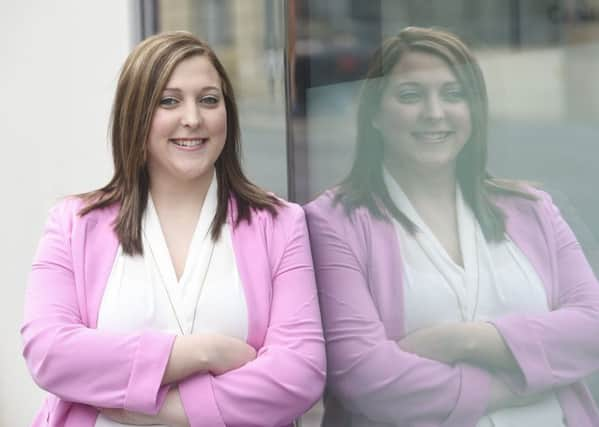Coeliac disease diagnosis turns woman's life around


Her GP had told her that she was depressed because of stress – common for young people who were faced with exams and major life choices – and that’s why she was struggling to get out of bed in the morning.
But eight years on, the 24-year-old has finally discovered the root of her ill-health – she suffers from coeliac disease.
Advertisement
Hide AdAdvertisement
Hide Ad“April last year was the first time I’d ever even heard it mentioned,” she says. “I was tested as part of a load of blood tests my new GP was carrying out as I was getting worse and worse – I had no life outside of work and some days even getting there was a struggle.
“Then I had an endoscopy last September and I got the official diagnosis in October. It has changed my life.”
Coeliac disease is no health fad. Unlike people who choose to give up foods which contain gluten for health benefits, people like Lauren cannot tolerate gluten in their bodies at all. While it may not be a life-threatening condition, the auto-immune condition can prove extremely debilitating for sufferers.
Around one in every 100 are believed to suffer from the condition but only around a quarter of them have a diagnosis.
Advertisement
Hide AdAdvertisement
Hide AdTo highlight the problems of coeliac disease, tonight the major charity which supports sufferers, Coeliac UK, is meeting MSPs at Holyrood to focus political minds on the disease, discussing diagnosis, care for those affected, availability of gluten-free food and research.
For Lauren, diagnosis has been the key to major change in her health.
“I was put on antidepressants when I was 16 for eight months and they had no impact at all on my physical symptoms,” she says. “They really just left me feeling numb; I had no lows but also no highs. Nothing was exciting to me, everything was just the same. I came off them and knew I’d never want to go back on them again.
“I thought I would have to accept that my life would be like this, that I’d be tired and sore, that I wouldn’t have any energy and that I’d have to deal with bouts of diarrhoea and constipation forever.”
Advertisement
Hide AdAdvertisement
Hide AdShe struggled through three years of university studying primary level teaching at Moray House. Her work took all her energy so there was nothing left for enjoying student life. No going out, no parties.
“I was sure there was something very wrong with me. My mum, Sheila, is an occupational health nurse and we looked at all sorts of things from lupus to lung disease to hyperthyroidism. I tried vitamins and herbal tonics, everything. Nothing worked. We were both at our wits’ end.”
Instead of teaching, Lauren moved into human resources and says things got worse two years ago when a change in her shift patterns saw her become unable to do anything except go to work.
“I was coming home from work crying then sleeping for 11 hours, 14 hours at the weekends. My body was knackered and at one point I told my fiancé Chris he’d be better off finding someone else as I couldn’t go out with him anywhere at night. He’s put up with so much,” she says. “My life had basically stopped and at 22 that’s not what you want. I went to the GP and said ‘you need to fix me’.”
Advertisement
Hide AdAdvertisement
Hide AdAccording to Lauren, that visit was the first time she felt her symptoms were taken seriously – and not just put down to “psychological issues”. It was also the first time she had heard of coeliac disease.
“I had no idea what it was – she just said she’d test for it along with other things. My initial thought was ‘oh no, I’ll never be able to eat pizza or macaroni cheese again’,” laughs Lauren. “I just love pasta.
“But when I got the diagnosis, I genuinely can’t explain the relief. I thought ‘I’m finally going to get better, I can have a life again’.”
It has been six months since Lauren’s diagnosis and she’s still getting to grips with living gluten-free. She discovered that coming off carbohydrates sent her body into withdrawal – for two days she had pains in her joints “as though someone was pushing hot pokers into them”, but woke up on the third day and it had passed.
Advertisement
Hide AdAdvertisement
Hide AdAnd while she can now stay up late – till 1am – and go out with friends, she’s found being gluten-free can be difficult in social occasions. “I think people think it’s a faddy thing,” she says. “I need a badge saying ‘I’m a coeliac, don’t judge me’. I don’t have a choice about this.
“I am so much better, though. I can have six hours’ sleep and feel fine. It is amazing to think it was gluten that was making me feel like that all those years – I was never depressed at all.
“All the nausea, the diarrhoea, the aches, they’ve all gone. The only issue I’ve had is my weight has rocketed, but I think that’s because there’s more sugar in gluten-free food so I now have to keep an eye on all that. But at least I have the energy now to go back to the gym.
“It’s just so great to feel like a normal person.”